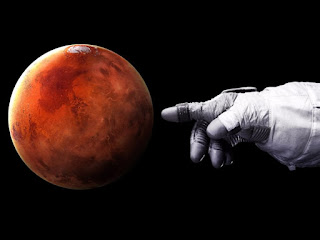Mars is Waiting
In late 1962, President John Kennedy boldly proclaimed, "We choose to go to the Moon" (see link). When he uttered those words, the Space Race was still in its infancy, John Glenn having been the first American to orbit the Earth only months earlier. No one seriously believed such a feat could be achieved so quickly. Instead, Kennedy's urging was admired because of its "dare to dream" quality, much needed in the dark days of the Cold War. Land a man on the moon and return him safely to Earth? Someday, sure - but by the end of the 1960's? Highly unlikely.
We all know how the story ends. Less than seven years later in July 1969 (only 66 short years after the Wright Brothers first got off the ground at Kitty Hawk, NC) Neil Armstrong and Buzz Aldrin set foot on our nearest neighbor in space, 240,000 miles away. Four days later they were safely home.
To explain why we went to the moon, one needs to understand the times. After World War II, the United States and the Soviet Union (Russia) were, militarily speaking, the two strongest countries in the world. They were also the only two that possessed thousands of nuclear weapons. And they were bitter ideological rivals. Coinciding with this nuclear proliferation was the development of rocket technology. At first, this was not undertaken for the exploration of space, but as a means of delivering nuclear warheads to an enemy's doorstep thousands of miles away. So, even though the Space Race began only as an extension of the larger Arms Race, it quickly captured the world's imagination and was a matter of deep national pride for both countries.
In the 43 years since that first moon landing much has changed. The Soviet Union has been extinct for a generation, bankrupting itself in a futile effort to keep pace with the United States in the Arms Race. America's space shuttle program, begun in the late 70's and never reaching beyond low Earth orbit, has since been retired. Near space is home to more than 8,000 man-made orbital objects, with just a mere 500-600 of these being operational communication and military satellites. The remainder are dead hulks, waiting to burn up in the atmosphere after their eventual orbit decay.
The Final Frontier, it seems, is closed for future human exploration.
Not so fast. There is a red planet not too far away (ok, not exactly nearby—at its closest Mars is 36 million miles from Earth—an 8 month journey). We first sent surrogates to Mars way back in 1976 when two unmanned craft (Viking I and II) landed safely—and permanently—within two months of each other. Since then, satellites have orbited and mapped Mars, dispelling many myths about the one planet in our solar system that seems most like our own.
But I honestly thought we would have sent people there by now, didn't you?
Fast forward to the past decade and the pace of our unmanned exploration of the planet—named after the Roman god of war—has quickened. Three separate rovers have safely landed, exploring and transmitting tremendous amounts of data back to Earth. Most recently, the stunning landing of the rover Curiosity captured the world's imagination. This voyager to another planet is the size of a compact car and will spend 2 years traveling the Martian surface.
So then why don't we?
There are plenty of very good reasons. Common arguments include: it is a waste of taxpayers money, we have monumental problems to solve here on our own planet, it's too risky, too dangerous, and what would ultimately be the point anyway? All valid and thoughtful reasons not to send men and women to Mars. Also, in my opinion, all irrelevant. I believe we need Mars now more than ever.
We need Mars because the entire human race needs something to collectively unite around and work toward. What better undertaking than a demonstration of our species' continuing ability to stretch beyond its limits and achieve something truly great? A manned mission to Mars would be the fullest expression of that belief.
Mankind is tired and careworn. Religious, racial and ethnic intolerance plague many places around the globe. A pervasive sense of futility has engulfed entire continents. Here at home, more and more Americans fear the future and its growing uncertainties. We. Need. Mars.
Expensive, yes. But why not an international mission then, one in which participating nations can contribute their ingenuity, their resources and their wealth to the endeavor? In this way, the entire planet can claim to be first on Mars. Nationalism would downplayed; humanity itself emphasized and raised up—a transformational moment in world history and perhaps even a catalyst that could soothe a suffering planet.
The question shouldn't be why, but why not?
A weary world is waiting.
Not so fast. There is a red planet not too far away (ok, not exactly nearby—at its closest Mars is 36 million miles from Earth—an 8 month journey). We first sent surrogates to Mars way back in 1976 when two unmanned craft (Viking I and II) landed safely—and permanently—within two months of each other. Since then, satellites have orbited and mapped Mars, dispelling many myths about the one planet in our solar system that seems most like our own.
But I honestly thought we would have sent people there by now, didn't you?
Fast forward to the past decade and the pace of our unmanned exploration of the planet—named after the Roman god of war—has quickened. Three separate rovers have safely landed, exploring and transmitting tremendous amounts of data back to Earth. Most recently, the stunning landing of the rover Curiosity captured the world's imagination. This voyager to another planet is the size of a compact car and will spend 2 years traveling the Martian surface.
So then why don't we?
There are plenty of very good reasons. Common arguments include: it is a waste of taxpayers money, we have monumental problems to solve here on our own planet, it's too risky, too dangerous, and what would ultimately be the point anyway? All valid and thoughtful reasons not to send men and women to Mars. Also, in my opinion, all irrelevant. I believe we need Mars now more than ever.
We need Mars because the entire human race needs something to collectively unite around and work toward. What better undertaking than a demonstration of our species' continuing ability to stretch beyond its limits and achieve something truly great? A manned mission to Mars would be the fullest expression of that belief.
Mankind is tired and careworn. Religious, racial and ethnic intolerance plague many places around the globe. A pervasive sense of futility has engulfed entire continents. Here at home, more and more Americans fear the future and its growing uncertainties. We. Need. Mars.
Expensive, yes. But why not an international mission then, one in which participating nations can contribute their ingenuity, their resources and their wealth to the endeavor? In this way, the entire planet can claim to be first on Mars. Nationalism would downplayed; humanity itself emphasized and raised up—a transformational moment in world history and perhaps even a catalyst that could soothe a suffering planet.
The question shouldn't be why, but why not?
A weary world is waiting.



Comments
Post a Comment